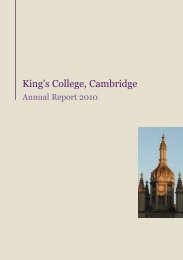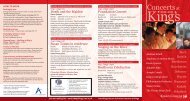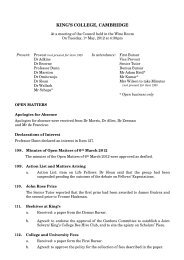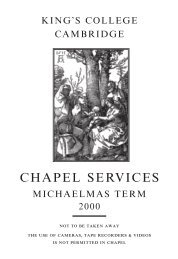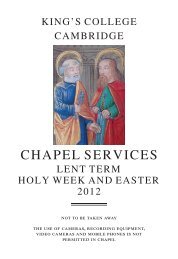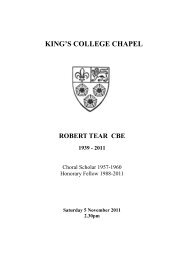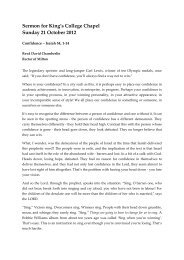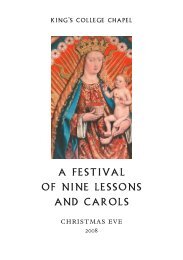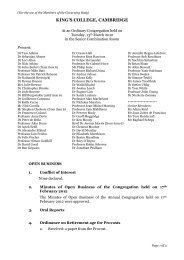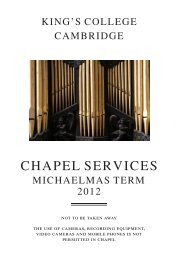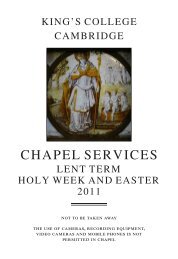Part 2 (Obituaries) - King's College - University of Cambridge
Part 2 (Obituaries) - King's College - University of Cambridge
Part 2 (Obituaries) - King's College - University of Cambridge
Create successful ePaper yourself
Turn your PDF publications into a flip-book with our unique Google optimized e-Paper software.
laboratories or out in the fields. In spite <strong>of</strong> his parents’ disapproval, at the end<br />
<strong>of</strong> his first year John took the opportunity to sign up to the Armoured Wing<br />
<strong>of</strong> the Officer Training Corps. He wanted to be in tanks, but before moving<br />
into a specialised regiment John had to undertake preliminary training. This<br />
meant sharing a barrack room with another 30-odd recruits at Fulford, near<br />
York, amongst whom he met two men from King’s, Barry Gibson and Ian<br />
Wylie – the latter a fellow Agriculture student and John’s close friend. All <strong>of</strong><br />
them elected to join the Royal Armoured Corps and were a crack platoon <strong>of</strong><br />
keen and quick learners.<br />
John was posted to the Royal Military <strong>College</strong> at Sandhurst. Within two<br />
months <strong>of</strong> graduating he was with the First Battalion, Royal Tank Regiment.<br />
He became Officer in Command <strong>of</strong> No 5 troop and was involved in the battles<br />
at Arnhem and in the Ardennes, as part <strong>of</strong> the Allied push. One dawn in 1945,<br />
two weeks before the German surrender, Lieutenant Noble was shot in the<br />
head by a sniper, eight miles from the objective <strong>of</strong> Hamburg. Standing in the<br />
turret <strong>of</strong> his tank answering a radio signal call, the bullet passed through his<br />
cheek and neck.<br />
John returned to <strong>Cambridge</strong> after two further years in the Army. He<br />
remained the committed student he had been, but cut the distraction <strong>of</strong><br />
college rugby from his life in order to complete his two remaining years <strong>of</strong><br />
Agricultural Science in a single year. Leaving <strong>Cambridge</strong>, John moved back<br />
to Australia to try to make a life for himself there. It was there he met Gwen,<br />
who became his wife. In 1954, John made enquiries about the new field <strong>of</strong><br />
farm broadcasting for the Australia Broadcasting Company, and soon<br />
enough, after work in radio, he was one <strong>of</strong> the very early weathermen<br />
on ABC TV.<br />
During his years at the ABC, John visited Africa and Asia to impart his<br />
knowledge <strong>of</strong> broadcasting as part <strong>of</strong> some courses sponsored by the United<br />
Nations’ Food and Agriculture Organisation. This fuelled John’s interest in<br />
travel, that he was able to engage in much more fully after transferring to the<br />
newly created position <strong>of</strong> Director <strong>of</strong> Publicity Services on the Australian Meat<br />
Board. The 12 years John spent travelling around the world educating<br />
173<br />
OBITUARIES



